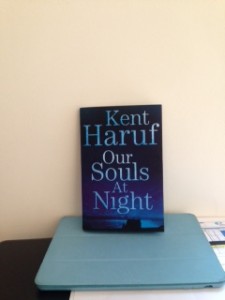Writers are always being asked this question. It kind of drives me crazy, though. My favourite author changes over time, with age, with circumstance. And I know that people are always expecting me to say something especially clever, or name someone surprising. So generally speaking, I haven’t really known how to answer this question, or if I even wanted to. But I’m happy to answer it now/for now.
In the post I recently received this:

Our Souls at Night is the last novel, posthumously published, of Kent Haruf, my favourite author. His passing last November was a great sadness. He was young – only 71 – and it felt like a quiet voice of truth slipped away from us forever. Haruf wrote six novels, all about the simple, yet complex, lives of the citizens of Holt, Colorado, the small town in the middle of nowhere which he created and peopled with some of the most endearing and compelling characters I have ever come across. These are characters who not only stay with you forever, but whom you begin to believe you really know. The novels Plainsong, Eventide and Benediction tell their story (as do his earlier, lesser known works), and when I heard about his death I was afraid that the town of Holt would have died with him. But now we have one last narrative. It is 179 pages of rather large type, but it shows that you don’t need a lot when every word is a gem. The NY Times said,
So delicate and lovely that it has the power to exalt the reader.
The reviewer from The Guardian said,
His courage and achievement in exploring ordinary forms of love are unsurpassed by anything I know in contemporary fiction…
I have written about Haruf and his work before, back in 2011, and I find that despite the years and the changes they have brought in me, I still use the same words to describe my feelings about Haruf and his work. You can read that post here.
I may be American, but America is a very big country. I probably now know more about the lives of rural Cambodians than I know about those lived in the rural West of the United States. Maybe that is why I am drawn to these stories. But I think it may have more to do with the cadence of his voices, the way Haruf can portray the huge spaces of the Western prairies within the spaces between his words. I don’t know — but it does feel as if each of his novels is a treasure. And now, to have one more, is a gift indeed, his last to all of us. I can’t wait to start reading, but I also don’t want to begin. Beginning only means coming to the end.

Recent Comments